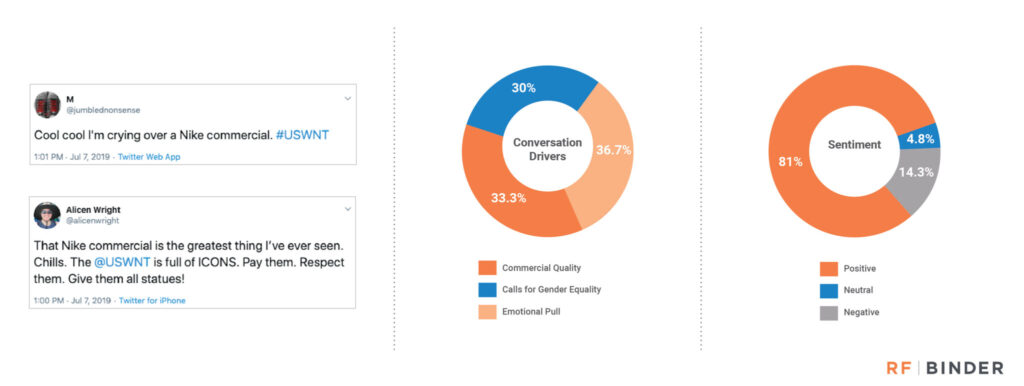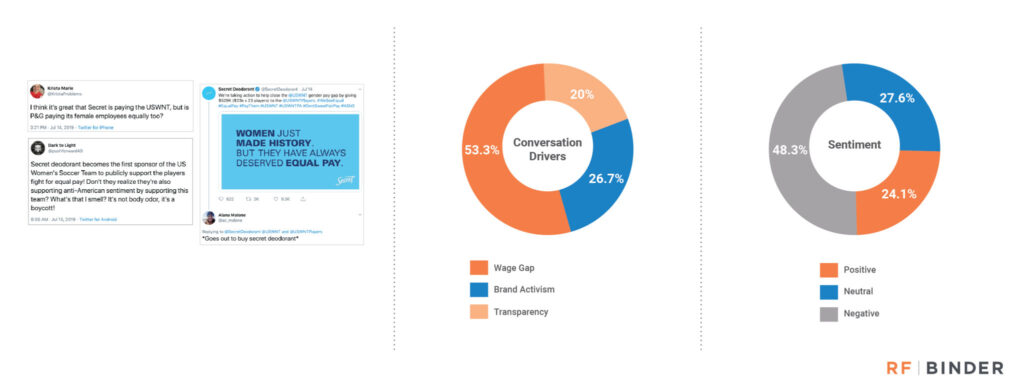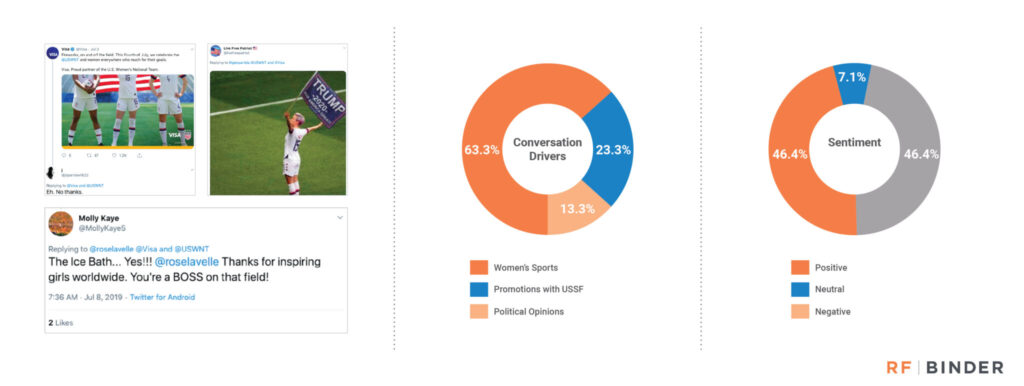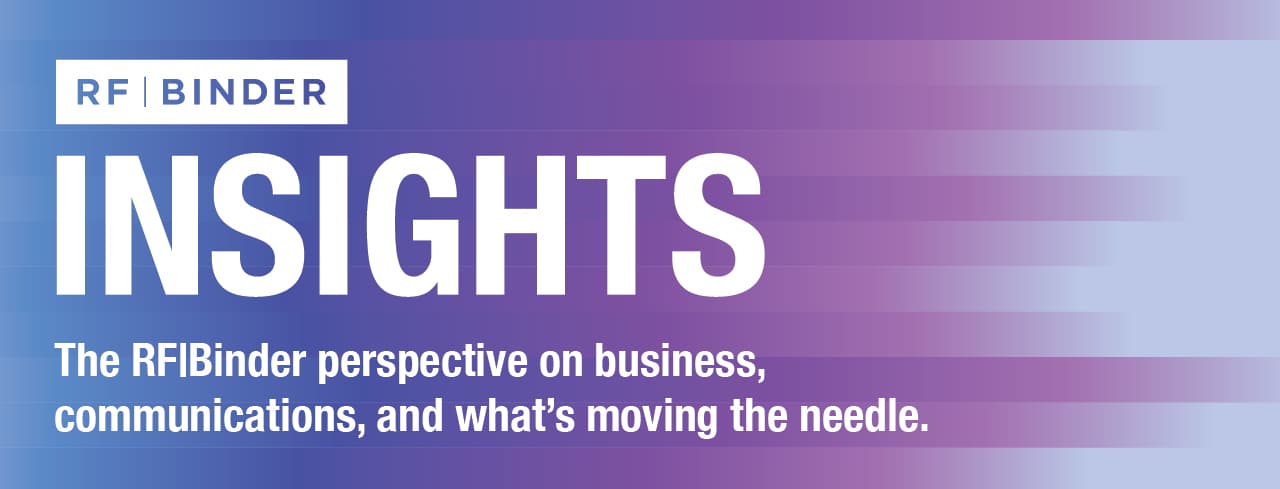The “Good Change” Report is a monthly analysis produced jointly by RF|Binder’s Social Impact & Sustainability and Integrated Planning & Analytics teams. With this report, we provide a look into which brands are driving today’s most important social and environmental conversations, and how the dialogue is taking shape. Each month, we use our proprietary tools to dig into one trending topic, pinpointing the most highly shared news stories, as well as consumer sentiment and key conversation drivers across social media platforms. Read on for this month’s hot topic: equal pay.
Pay parity remains a pressing issue for women around the world. According to the Institute for Women’s Policy Research, women still earn just 81 cents for every dollar that men earn in the United States. Worse, while white women earn about 82 cents for every dollar that white men earn, black and Hispanic women earn just 65 cents and 61 cents, respectively, compared to white men.
This summer, the issue of equal pay was spotlighted more prominently than usual, when the United States Women’s National Team (USWNT) won the Women’s World Cup for the fourth time. Amid the parades and celebrations, some critics – including brands and consumers alike – called out the U.S. Soccer Federation for the wage gap between its male and female soccer players. While some commenters argued that the lower pay for women is justified by the comparatively lower revenue generated by the team, others pointed out that the argument is specious; the U.S. women’s team in fact had stronger ticket sales and brought in more revenue than the men’s teams between 2016 and 2018.
As always, major brands waded into the fray – and some did so much more effectively than others. For this month’s Good Change Report, RF|Binder’s Social Impact & Sustainability team, in partnership with our Insights, Planning & Analytics team, explored some of the most prominent brands that contributed to the conversation about the USWNT’s pay gap, the tactics that these brands used to engage with their audiences, and the range of responses that they garnered in social media conversations.
Our key takeaways:
1. It’s critical to engage your customers emotionally
Nike gets our prize for best contribution to the conversations about the USWNT’s victory and pay gap. Nike clearly understands its customers and what matters to them, and the company has already demonstrated a willingness to take a stand to support of its values, so it came as no surprise that Nike had something to say about the USWNT World Cup victory. In its emotionally-compelling sports-victory-style advertisement, Nike celebrated the win while critiquing the current status of gender equality. Social media commenters responded very positively to this ad, which succeeded in conveying hope and inspiration for progress while also sparking serious conversations about equality.
In much the same way that people connect with their favorite team – hanging on the edge of their seat for the last minute win… or loss – emotion elicits response. Using that fan devotion as a driver, Nike proved that it is okay to get emotional in a powerful way. An emotional campaign inspires a range of reactions and feelings, from passion to sadness to inspiration, giving space for consumers to have an individualized experience while also feeling like part of something bigger.

2. Money can’t replace true purpose
Some other brands were less effective. Procter and Gamble, through its deodorant brand Secret, donated $529,000 to the USWNT – an amount that symbolized the gap in their pay vs. their male counterparts, calculated as the sum of $23,000 for each of the 23 players on the World Cup roster. The donation clearly highlighted the disparity in pay, but it ultimately caused a backlash: Numerous social media conversations indicated that customers felt it was disingenuous for Secret and its parent company to criticize the USWNT’s pay gap without first clarifying P&G’s own gender pay policies.
Increasingly, consumers feel that simply putting money toward a cause or pledging a donation amount is not enough. Consumers now expect brands to influence societal changes, AND they expect the brand’s house to be in order before criticizing another organization. Money is a way to show quick support, but without a deeper message and commitment, money alone falls flat and opens space for criticism. In the case of Secret, commenters questioned the authenticity of P&G’s donation, a response that a company as committed to purpose as P&G should have anticipated.

3. Partnerships alone only go so far
As a major sponsor and partner of the USWNT, Visa promotes the team members and the games but does not tie its support to a larger campaign. As a result of the partnership and Visa’s positioning of the members of the team as role models for consumers, the company was drawn into some the gender pay conversations. Still, Visa did not take a proactive position, and its partnership was not significant enough to make Visa a prominent fixture in online discussions about pay. Visa ultimately didn’t suffer any discernable negative fallout, but it also did not appear to benefit from any of the positive sentiment associated with the moment.
Partnerships are often intended to amplify a brand, but intentions alone are unlikely to drive the anticipated impact. Visa was drawn into critiques of the U.S. Soccer Federation and the pay gap between female and male players simply because it is a well-known and big-brand sponsor. The brand stayed authentic as an advocate for the female soccer players throughout the backlash, but didn’t go above and beyond to contribute a meaningful perspective or take additional action, resulting in a neutral social media response.

The core theme of consumer appeal that runs through each of these three stories is brand authenticity. Authenticity drives loyalty. Today, consumers expect brands to be authentic not just to their missions and products, but to their purpose and position on social issues. Brands may not win with consumers every time, but with authenticity they can achieve longevity in consumer loyalty.
For questions about our report, or to discuss how our team can help create leadership for your purpose-driven brand, email RF|Binder’s Social Impact & Sustainability team at sis@rfbinder.com.

